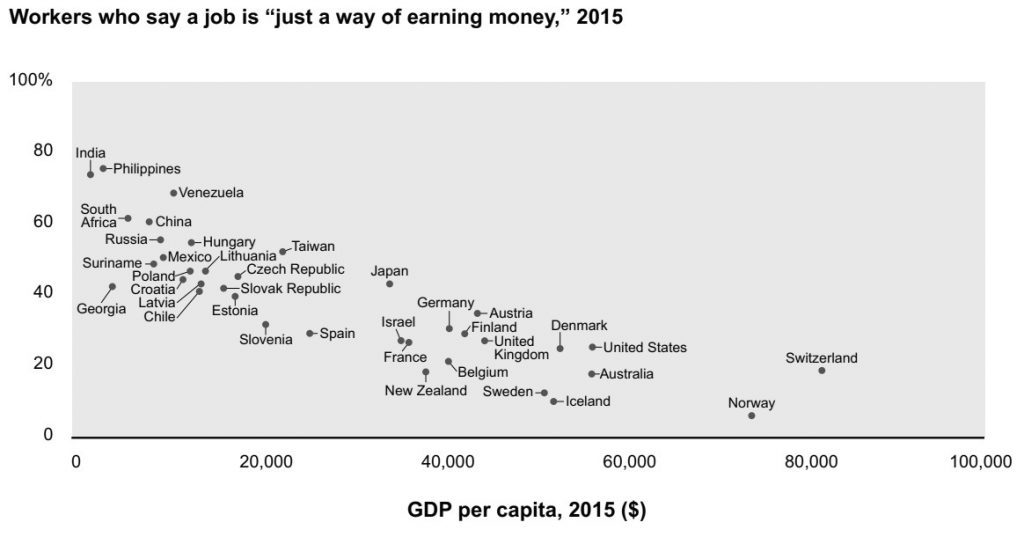Work will never be the same again. The Covid-19 pandemic catalysed changes that had long been brewing.
The Bain & Company report, The Working Future, highlights five key themes that are reshaping the future of work and the steps firms need to take to get ahead in the shifting war for talent. Among the 20,000 workers surveyed in the US, China, Germany, France, Italy, Japan, India, Indonesia, Nigeria and Brazil, 58% feel the pandemic has forced them to rethink the balance between their work and their personal lives.

“Much of the prevailing thinking about the relationship between workers and firms was forged in a very different world than the one we live in today, where options were more limited and relationships more transactional,” said Andrew Schwedel, partner at Bain & Company and co-chair of the firm’s think tank, Bain Futures.
He opined that today’s environment requires a radical rethink of both the structure and the purpose of work, but to do that one needs to first understand the shifting motivations of individual workers.”
Five key themes that are reshaping work

Sources: ISSP; World Bank; Bain analysis
Motivations for work are changing. Gains in living standards over the past 150 years are allowing us to spend less of our time working and raising expectations about what a job should provide.
While compensation still ranks among the top priorities for most workers, only one in five now rank it as the number one factor in a job with interesting work, job security and flexibility also among the most important priorities.
This research shows that as community organizations and religious observance have declined in prominence, new generations of workers may turn to their careers to provide social connection and a sense of higher purpose.
Far from the idle leisure class of bygone eras, the upper echelons of today’s society now work the longest hours of all, as busyness is seen as a sign of status. Those at the bottom of the income hierarchy now work the least hours, as they are often unable to secure the stable full-time employment they desire.
Beliefs about what makes a “good job” are diverging. As attitudes toward work fragment, the average worker is no longer a useful approximation. Bain has identified six worker archetypes, each with a different set of priorities: operators, givers, artisans, explorers, strivers and pioneers.
This research shows the need for business leaders to recognize that their personal perspective of what a good job looks like won’t necessarily be shared by everyone in their organization, especially those on the front lines.
Automation is helping to rehumanize work. Distinctly human advantages— problem-solving skills, interpersonal connection and creativity—are growing in importance as automation eliminates routine work.
Bain expects to see a shifting occupational mix in developed economies that will favour uniquely human skills in the workforce of the future. This will require a major reskilling of the workforce.
Technological change is blurring the boundaries of the firm. The pandemic has profoundly shifted the way workers interact with their firms.
Together, the rise of work-from-home and the gig economy have loosened the boundaries of the firm, making the ideas of a workplace and a worker more fluid. While these changes decrease costs for companies, they offer a mixed bag for workers. The job satisfaction levels of contract workers are markedly below those of permanent employees.
Bain’s survey shows that 47% of workers globally view many of their colleagues as friends. This level of connection and trust is a critical ingredient for effectively operating complex businesses. The big question is whether companies can maintain connection and trust without the physical connection provided by offices.
Younger generations are increasingly overwhelmed. Young people, especially in advanced economies, are under mounting psychological strain that spills over into their work lives.
3 action items for business leaders
Winning firms will pivot from being talent takers to talent makers. This requires scaling investments in learning, thinking laterally about career journeys and cultivating a growth mindset in their organization. While incumbents increasingly struggle against skills shortages, their insurgent rivals are finding creative ways to tap into the hidden potential of their people.
Leaders will stop managing workers like machines. Instead supporting them to build personal capacity and create a career that matches their individual idea of a meaningful life. As part of this, leaders will reorganize workflows to help individuals best utilize their uniquely human advantages.
Winning firms will build an organization that offers a sense of belonging and opportunity for its many unique workers. At the same time, they will strive to remain united through a shared vision and communal values.

“Growing competition for talent has put the future of work squarely in the spotlight for business leaders,” said James Root, partner at Bain & Company and co-chair of Bain Futures.
“Now is the time to focus the human side of work, which will allow leading firms to attract, develop and retain the workforce that is core to their future success.”




